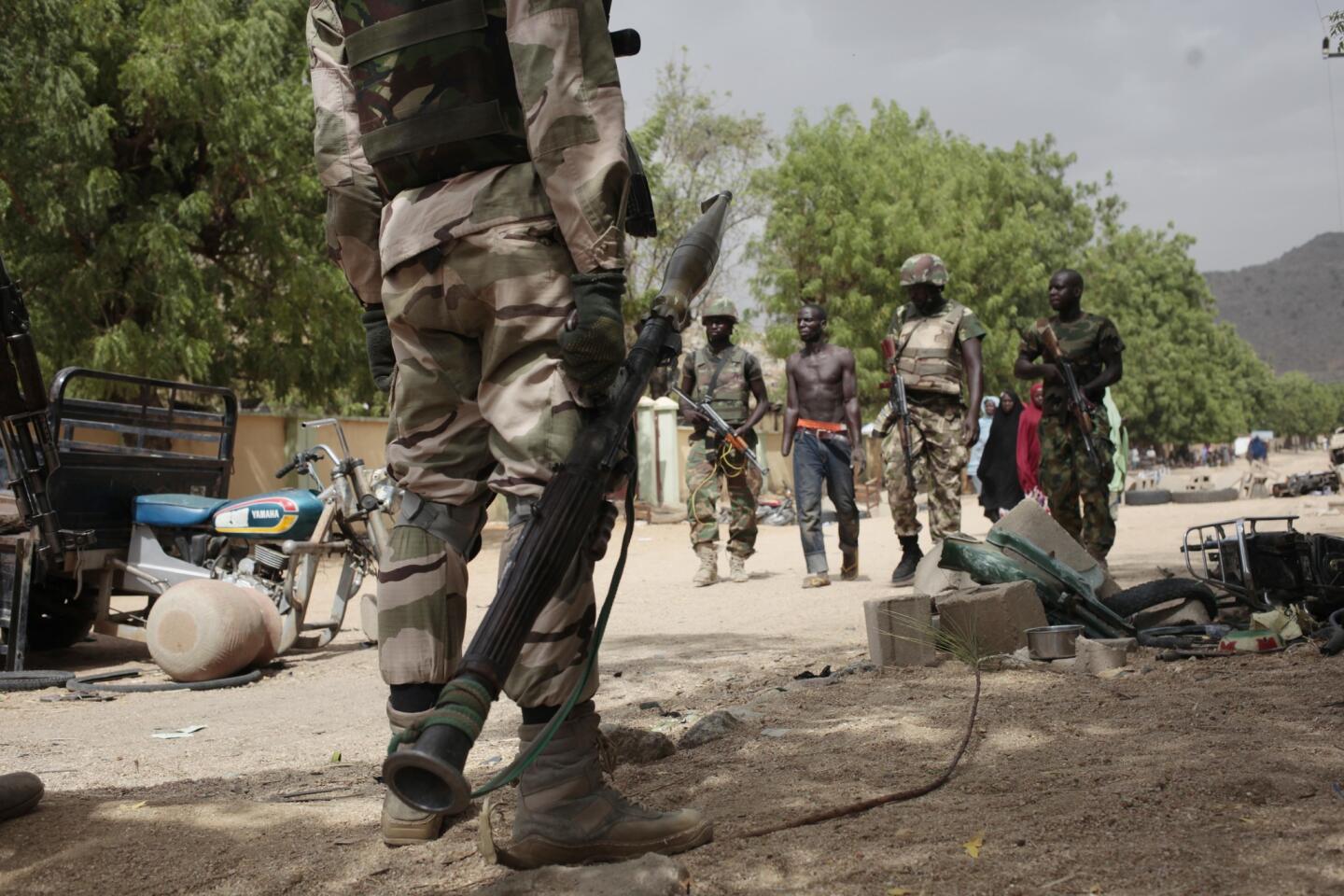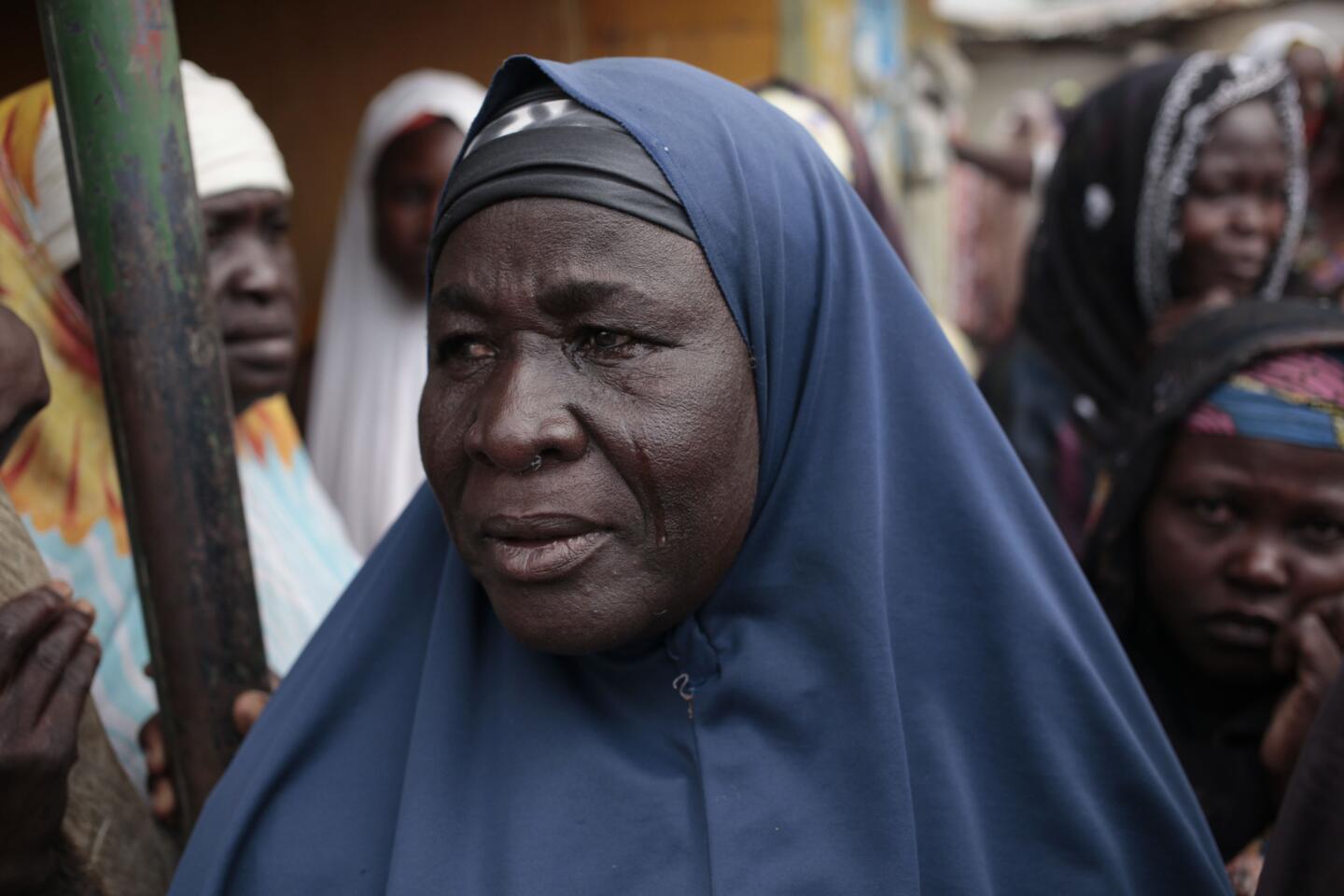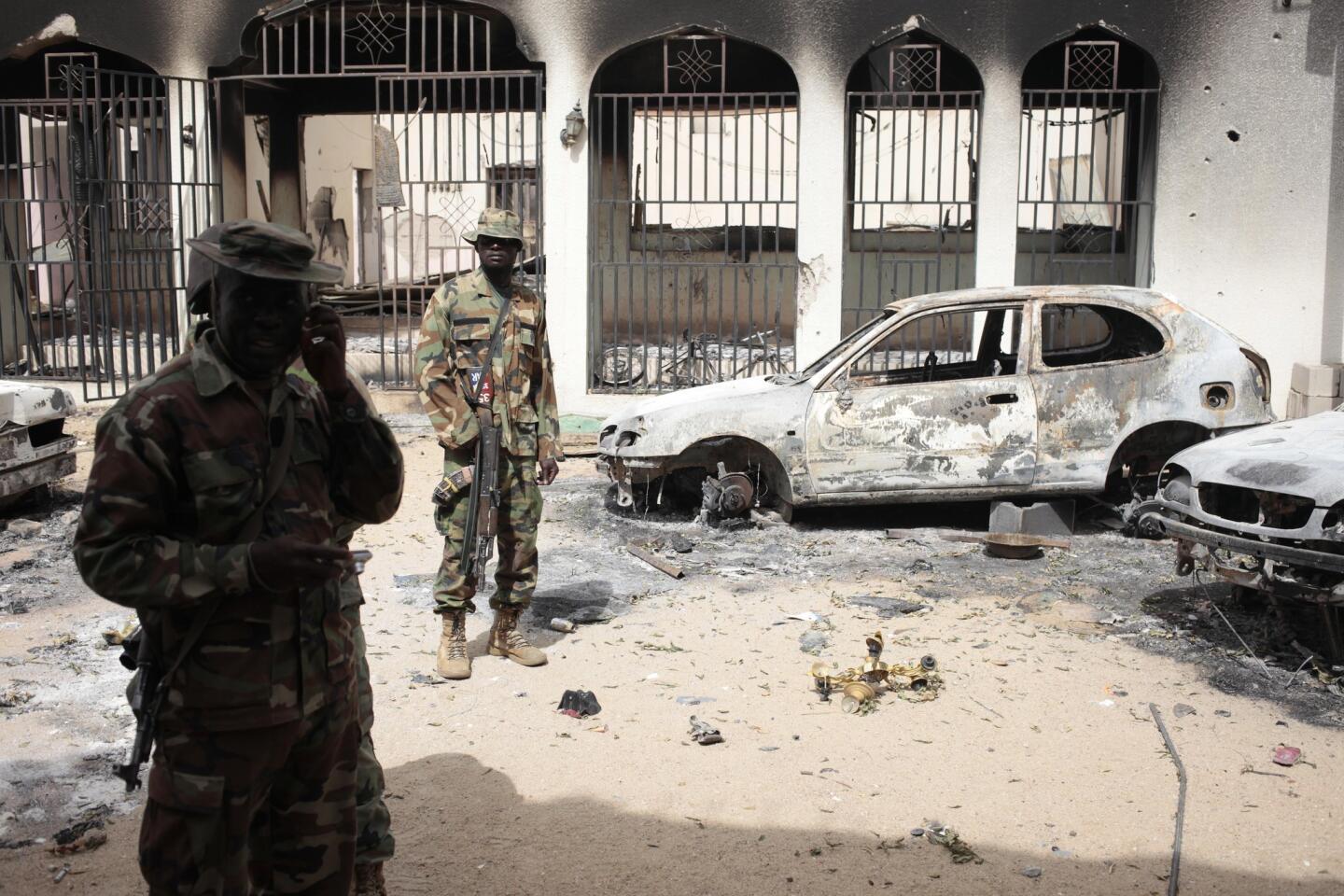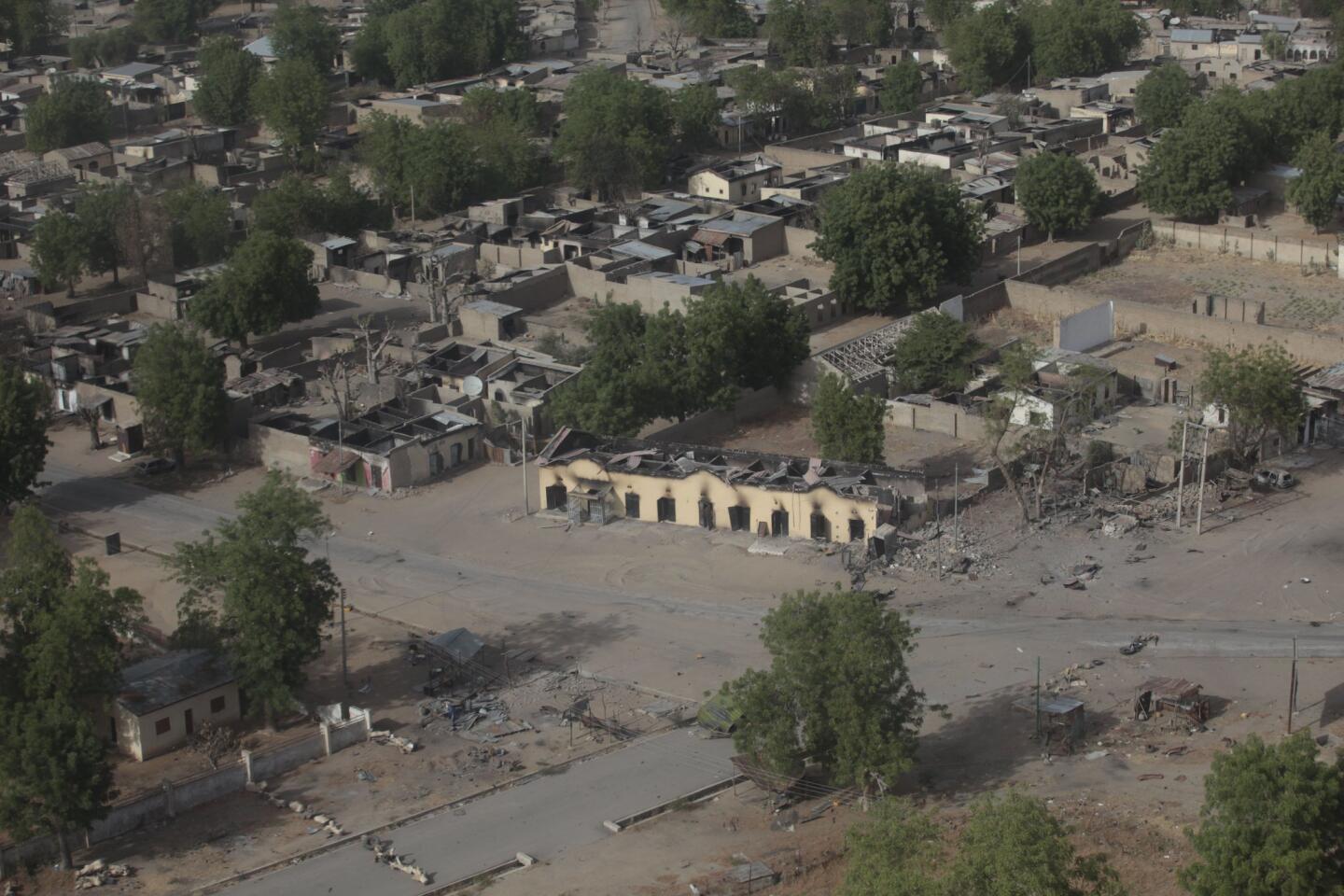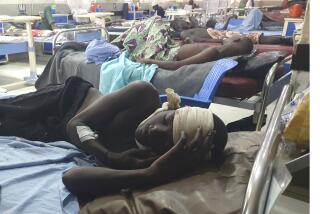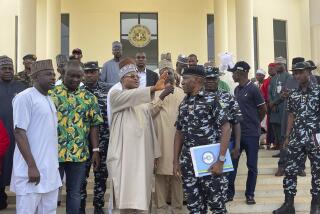Great Read: Nigeria survivors of Boko Haram attack recall ‘total terror’
Reporting From Kano, Nigeria — The evening was closing in when the first few shots sounded. Men locked up their little shops and ran, looking for safety. Women in the streets quickly finished their conversations, then scurried home and locked their doors.
Abubakar Shekau, commander of the militant group Boko Haram, had descended on the northeastern Nigerian city of Gwoza, determined to make it the capital of his own Islamic caliphate.
Hauwa Umar’s father was one of the first to be shot that evening in August. The 18-year-old cried not just for his death, but also for the dozens of men and boys lying in the red dust, beheaded, their heads plunked roughly on their backs like gruesome trophies.
“What I saw that day was terrible: There were uncountable bodies without heads,” she said in the city of Kano, where she later took refuge. “Boko Haram kept saying, ‘Stop crying! Stop crying!’ I couldn’t stop crying, and they’d shoot their guns in the air to shock you. But I kept on crying.”
At night, women crept away into the hills, dressing their sons as girls, to escape. Some men tried to pass themselves off as women, but many were unmasked by Boko Haram and killed.
When the shooting stopped three days later, the streets were full of women pushing their dead sons, husbands, fathers and brothers, in handcarts and wheelbarrows, covered in leaves.
“The whole town smelled of death,” said Mariam Adam, a midwife. “What really affected me is the way that we women had to bury the men. It’s very difficult, and it’s something I’ll never forget in my life.”
::
Accounts of Boko Haram’s atrocities as it swept through the region last year have been sketchy. Cellphone networks in the region are poor, and journalists and human rights workers have been denied safe access. But 14 people who fled through the hills behind the town and escaped, mainly to Kano, recently offered a horrifying picture of the attack.
Amnesty International this week said more than 600 people had died in the attack on Gwoza, adding that the real number was probably much higher.
Boko Haram, which recently pledged allegiance to Islamic State, preceded the Syrian-based group in its partiality to beheadings, images of which are circulated on primitive cellphone videos. It kills any male — Muslims, Christians, priests, boys and old men condemned as “infidels” because they don’t follow Shekau.
The group’s abduction of 276 schoolgirls a year ago shocked the world, but its brutality has gone much further: When the group sacked Gwoza, its fighters beheaded boys and men like goats, burned dozens on a pyre and announced that the women were slaves who would be forcibly married off or sold. Boys as young as 10 were shot.
Many other boys were abducted and forced to join the group to fight and learn its hard, narrow view of the Koran, played out in endless killing and suicidal jihad. No one knows how many boys were abducted, how many males were killed, and how many women were forced into marriage in Gwoza during Boko Haram’s terrifying eight-month occupation of the city of about 275,000.
::
Hours before Boko Harm launched its attack on Gwoza, the army drove away from its garrison, leaving an armory full of weapons. First, Boko Haram looted the military base.
One group sped across the dusty football field on motorbikes, shooting down the boys playing soccer and many others, recalled one resident, Fatima Sadiq. Then they attacked the palace of the local emir, the traditional Islamic ruler, where the Boko Haram commander proclaimed himself the new emir.
Ladidi Ahmadu was stopped by fighters there with about 20 other women.
“They built a fire of old tires. They gathered the young men and started pushing them into the fire with their guns. I saw about 70 people killed that way. The youths had no choice. They had guns at their heads,” she said. “We were shocked out of our minds. Boko Haram were celebrating, shouting, ‘God is great!’
“After the killing, the ‘emir’ of the Boko Haram came out and started lecturing us. He said, ‘You are all infidels. You are not Muslims. We are the only Muslims. You people, from now on you are under us. You are not married to anyone. There’s no more government. There’s no more president. We are in charge.”
The fighters conducted house-to-house searches, killing men and boys found hiding and even shooting into the ceilings where men were hiding.
“Some lasted three weeks in the ceilings. Some died from suffocation and hunger,” Sadiq said.
Aisha Umar, 18, saw Boko Haram fighters drag a man from his house and behead him. “He was crying. Boko Haram said, ‘All of you in this town who don’t believe in our creed are infidels, so we are obliged to kill you.’”
They looted all the shops and the only medical dispensary. They beheaded a local imam, said Aisha Audu, 50. The cleric’s family buried him, but Boko Haram dug his body up and left it outside his house for three days.
Fatima Mohammed, who had just given birth, fled in a heavy drizzle with a group of women several weeks into the occupation. In the nearby village of Liman-Kara, she saw a Boko Haram execution. A dozen young men in T-shirts and jeans were lined up at the steep edge of a pond.
“And the leader of the executioners was by the roadside reading from the Koran. Each time, they shot once into the air, close to the victim, then another would just shoot the victim and shout ‘Allahu akbar’ and the person fell into the pit. The women began to cry. The leader shouted, ‘Shut up, go back home, we don’t want this hypocrisy.’
“I saw three people killed before I moved on. I couldn’t even look at their faces.”
::
During its eight-month reign, Boko Haram set up a primitive “state” that enslaved the women — and some men — and delivered nothing but a few bags of rice or pasta looted from shops. It set up Islamic schools under the trees where old men, women and small boys recited the Koran.
“You couldn’t call them by their names. You just called them Yaya [big brother],” said Sadiq, who fled 10 days after the initial attack, after a Boko Haram fighter proposed to her. Women found trying to leave were jailed, and those who scrounged for food in neighbors’ abandoned houses were flogged, residents say. Some residents’ hands were amputated for theft.
Aisha Umar, the 18-year-old, was arrested by Boko Haram and wound up in one of the jails, a large house with many rooms.
“We were more than 100. The women were all crying. Boko Haram were saying, ‘You don’t have any house except this one now, so stop crying.’
“They kept telling us that we have to be ready to marry them. We were in total terror.”
After three days in the jail, she and seven others in her room, including one with a baby on her back, climbed the wall at 2 a.m. and fled.
Not all the fighters liked killing, Sadiq said, describing two exhausted teenage gunmen slumped in her house, whining.
“One of them, about 16, complained, ‘I’m tired of this job. This gun is becoming too heavy for me.’ He said he was tired of Boko Haram, tired of the killings, the lack of comfort, the lack of sleep.”
Boko Haram’s departure last month was as brutal as its arrival. The militants herded about 70 old men into a slaughterhouse and shot them, according to those who fled Gwoza.
Some of the fighters resorted to one final apocalyptic gesture: a massacre of their new, captured wives, to be sure of finding them in paradise, one farmer said.
Usman Ali, 35, a farmer from the nearby village of Kilekasa, was forcibly drafted by Boko Haram at the end of its siege of Gwoza.
He watched as fighters brought dozens of the wives to the Gwoza market square “and opened fire on them. One of the women was heavily pregnant and asked to be spared until she had her baby. But her request was refused.”
Boko Haram has been driven from most of its territory. Its “caliphate” has fallen. Nigerians hope the recently elected former military dictator, Muhammad Buhari, will destroy the group.
But after other defeats, Boko Haram returned, seemingly from the dead. It will probably fall back on suicide attacks on soft civilian targets, as its victims try to rebuild their lives.
“We were helpless,” Audu said. “These people wouldn’t spare a boy or an old man. No Muslim in his right mind could follow this madness.”
Special correspondent Aminu Abubakar contributed to this report.
More to Read
Sign up for Essential California
The most important California stories and recommendations in your inbox every morning.
You may occasionally receive promotional content from the Los Angeles Times.
